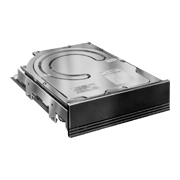Announced by Mitsubishi Electric in 1983, this was a sealed hard disk unit which used a 5.25-inch (13.3cm) magnetic disk, and halved the thickness of its previous model. Its maximum memory capacity was 12.75MB.
This unit had the following features:
- Thickness was half that (half size: 41mm) of its previous model (M4863), and this enabled twice the packaging density.
- Even though it was half size, the unit achieved a high memory capacity of 12.75MB.
- It achieved high-speed transfer at 5Mbit/s, with high-speed access at an average seek time of 85ms.
- A simple, high-precision, high-reliability mechanism was realized using a positioning mechanism employing a stepping motor, and a direct spindle mechanism employing a DC brushless motor.
- The structure was completely sealed, so the unit was not affected by adverse dust environments.
- It used an industry-standard ST506 interface.
| Unit memory capacity | 12.75MB |
|---|---|
| Side capacity | 6.37MB |
| Track capacity | 10,416byte |
| Number of disks | 1 |
| Recordable sides | 2 |
| Number of cylinders | 612 |
| Recording system | MFM |
| Bit density | 9,201bit/inch |
| Track density | 690track/inch |
| Data transfer speed | 5.0Mbit/s(625Kbyte/s) |
| Positioning time | Min. 18ms,Max. 199ms,Average 85ms |
| Rotation speed | 3,536rpm |
| Rotational delay | Average 8.48ms |
| External dimensions(Width x Height x Depth) | 146mm×41.3mm×203.2mm |
| Weight | 1.6kg |
In 1984, Mitsubishi announced the MR522 which achieved a memory capacity of 25.5MB by incorporating two recording disks (4 recording capable sides) in a cabinet of the same size.
In 1985, Mitsubishi speeded up the average positioning time to 38ms by using a miniaturized voice coil motor, increased the track density by 1.5 times to 1,028track/inch, and set the number of cylinders to 971. They announced the MR533 with 2 disks (3 memory capable sides) and a memory capacity of 30.33MB, and the MR535 with 3 disks (5 memory capable sides) and a memory capacity of 50.55MB.


